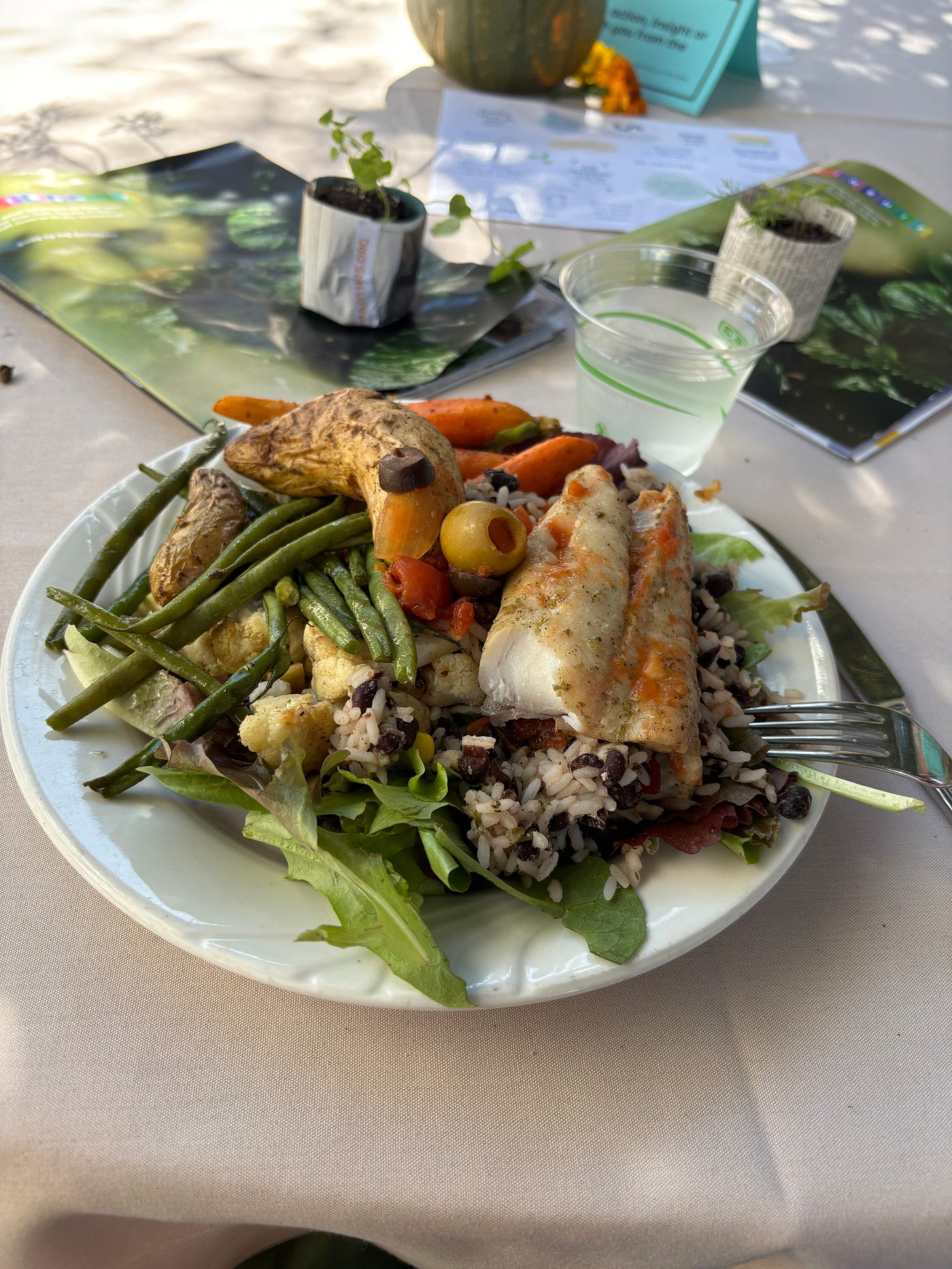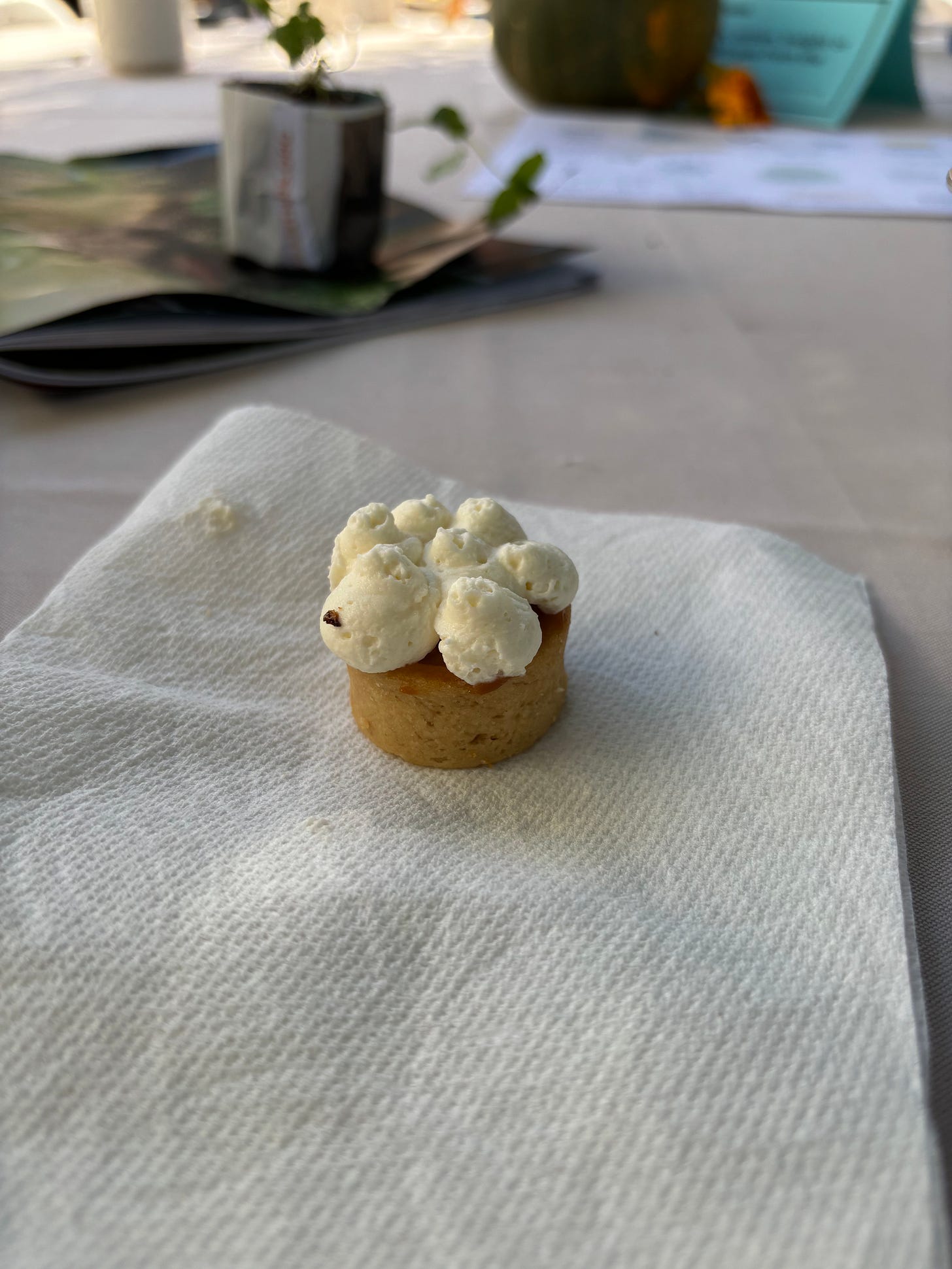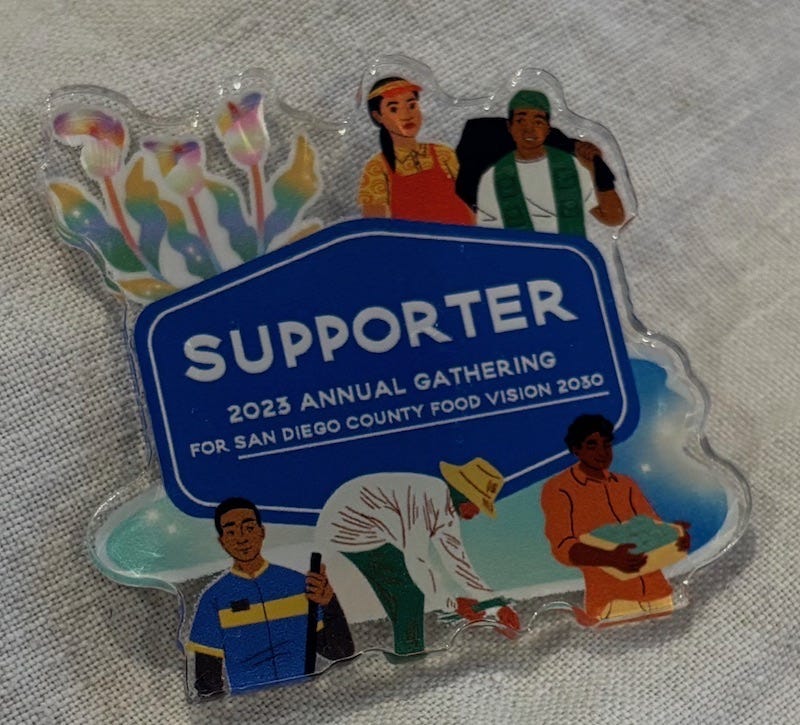The Third Annual Gathering hosted by the San Diego Food System Alliance
A recap of one of the most fulfilling days I've had in a long time
Last week, I did something that was so great, delightful, and wonderful that I almost don’t have the words to describe it. But I’m going to try and find the words because you know, that’s kind of the whole point of Substack. The thing that I did was attend the Annual Gathering hosted by the San Diego Food System Alliance (SDFSA), which is essentially their annual conference* which brings together people from various parts of the food system in San Diego and it was a day of talks, panel discussion, networking, and really, really good food.**
(Pictured above was my lunch, a plate of a huge variety of veg and a piece of fish. And what was basically a bite-sized banoffee pie for dessert. It was great. I love banoffee pie.)
I first learnt about the SDFSA about three years ago, from a well-placed Instagram ad. It was around a time when I was deep into reading about the food system in America, as well as a time when my husband and I were discussing where to direct our charitable donations. The SDFSA was a very small organisation at the time, and their mission was different to that of other food-related charities and non-profits. They weren’t a food bank where they could quantify what your donation could provide (‘$20 will provide X meals for hungry families’), or a food recovery/food waste organisation that could tell you how many pounds of food waste they diverted from landfill in a given year.
The mission of the SDFSA was (and is) to help develop a stronger, more resilient, more sustainable, and more just food system in San Diego. This is much, much harder to quantify. Because how do you measure success when the rate of change is slow, and when the outcomes you want may not be seen for years or even decades? (‘$20 will mean we can have half a meeting with someone that might change one thing later, maybe.’) When what you’re doing as an organisation is not to provide outcomes yourself but rather to change broader political policies, and foster connections and relationships between other actors within the food system, it can be hard to measure success. It’s a bit of a nebulous metric, honestly. But if they were good, then this was the organisation that could change what really mattered, and would not just address the symptoms of the problems left by the food system, but could fundamentally change the system itself. And goodness what an exciting prospect that was.
So for the past few years, since I first saw that Instagram ad, I’ve been in regular contact with someone from the SDFSA, to learn about what they’re doing, the progress they’ve made, and their plans for the future. They’ve been doing some excellent work in changing policies, shifting the conversation about food, and supporting small actors within the local food system to become more resilient. In short, I love what they do and I am so very glad that they exist.
The Annual Gathering is a day where a whole lot of people who care about food, justice, and the food system come together to participate in panel discussions, listen to speakers, and make new connections with other people within the system. This year was their third Gathering, and it had about 500 people in attendance. It was my first time going, and it was amazing. The food was prepared by great chefs, and the ingredients were locally and sustainably sourced. It was all delicious and the best conference food I’ve ever eaten (to be fair, academic conference food doesn’t set the highest of bars, but this food was also legit good even if you compare it to restaurant food).
The day began with exploring what was termed the ‘community hall’, a collection of stalls from local businesses and organisations across San Diego County that were somehow part of the food system. I saw and spoke with people involved with local fisheries, not-for-profits that worked to get fresh produce out to low income families, an organisation supporting the local homemade food economy (MEHKOs), and organisations working to improve the quality of school food.
Then, after an inspiring and most excellent opening ceremony (featuring some great speakers and a performance by inter-tribal bird singers), we got into the nitty gritty of the day — the panel discussions. There were three sessions throughout the day, with parallel discussions in each session. Throughout the day, I attended sessions titled ‘Community Collaborations for Building a Healthier Food Assistance System’, ‘Beyond Food Recovery: Mutual Aid and Community-centered Solutions’, and ‘Political Kinship: Building a Relationship with the Policy Process and Advocacy’.
I mean, just look at the titles of those panels. Could there be anything more fantastic than this? The discussions were informative and encouraging. This was a gathering of 500 people who care about the same things that I do and they’re all doing something to change a system that many of us recognise is flawed. I wrote recently about whether I’m really making that much of a difference as one consumer and here is a group of people who have started or are working for organisations that are doing things to change some part of the food system for the better. It felt like I had found my people.
More specifically, these are some of the organisations I learnt about that day:
Plus-Box, a non-profit that distributes boxes of fresh produce every week to families in need
Hukama Produce, a small farm in Ramona that sells its goods at farmers markets around the county and also works with Plus-Box
Produce Good, a non-profit that acts as a link between growers who have excess produce and organisations that accept food donations
Community Alliance with Family Farmers (CAFF), a group that concentrates on policy advocacy for small farmers in California (they’re like lobbyists except they’re a much smaller group and way less funded than lobbyists from the food industry and the large agriculture industry)
Life Acts, a faith-based non-profit that distributes food to those who need it, and also works in disaster relief and community outreach
Porchlight Community Services, a food pantry that rescues food from supermarkets and other local businesses and redistributes it to those who need it
Bayside Community Center, a neighbourhood based non-profit that provides social services (including food recovery and food redistribution), educational opportunities, and advocacy
This is a mere snapshot of the organisations represented at the Gathering (remember when I said there were parallel sessions? I couldn’t be in five places at once, so there were many panels I couldn’t attend, and with 500 people there, many people I didn’t meet). It was a very full day, and it left me feeling hopeful about the state of the food system in San Diego. It is far from perfect, and the system is still embedded within a much bigger and flawed food system, but there are passionate and committed people doing things to make it a little bit better. After the session on political kinship, I had a chat with Consuelo Martinez, a council member for the City of Escondido and who also is on staff at SDFSA, about how it seemed like my tiny actions as a consumer didn’t matter because they were so small, and I was frustrated by how big the problems were and how it felt like anything I did would not really matter. She said that what we were doing as grassroots organisations and as consumers were small, but not insignificant. Small, but not insignificant. That was the note that ended my day at the Gathering and how appropriate and perfect that was.
*I used the term ‘conference’ even though that was not at all what the SDFSA called it. I’m not entirely sure why because it had the structure and features of every conference I’ve ever been to — food, people, networking, opening speeches, parallel sessions. Maybe ‘conference’ sounds too formal for a grassroots activist organisation?
**This was the first time since 2015 that I went to a conference and did something that engaged my brain for an entire day that was completely unrelated to being a parent. It was kind of great.






